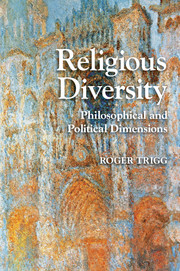Book contents
- Frontmatter
- Dedication
- Contents
- Introduction
- 1 The Challenge of Religious Diversity
- 2 Do Religions Claim Truth?
- 3 Religious Pluralism
- 4 The Roots of Religious Belief
- 5 Does Disagreement Undermine Theism?
- 6 Education and Religious Diversity
- 7 Truth and Coercion
- 8 Religious Diversity and Identity
- 9 Religion as Personal Preference
- 10 Freedom and Religion
- Bibliography
- Index
- References
2 - Do Religions Claim Truth?
Published online by Cambridge University Press: 05 June 2014
- Frontmatter
- Dedication
- Contents
- Introduction
- 1 The Challenge of Religious Diversity
- 2 Do Religions Claim Truth?
- 3 Religious Pluralism
- 4 The Roots of Religious Belief
- 5 Does Disagreement Undermine Theism?
- 6 Education and Religious Diversity
- 7 Truth and Coercion
- 8 Religious Diversity and Identity
- 9 Religion as Personal Preference
- 10 Freedom and Religion
- Bibliography
- Index
- References
Summary
PLURALISM AND RELATIVISM
Religions that only express the personal attitudes of the believer cannot claim any truth that can be rationally assessed. Faith then is merely an idiosyncrasy that some have and some do not. As we have seen, however, this approach leaves unexplored the important issue of what faith is directed at. Is it the world, or reality? This question raises issues about truth, and if that becomes the monopoly of empirical science, religion is again pushed aside.
The fact that we can talk of different religions suggests that the notion of religious faith as a totally individual matter is misplaced. Faith is typically a body of belief and practice that is shared. The nature of truth is that it has to be communicated and learned. If truth is totally subjective, this means there can be no constraint on what I believe. I do not have to communicate my beliefs to others or learn from others, and my beliefs do not have to be measured in some way against the hard facts of reality. I can believe whatever I like, but that means that belief is pointless. The very idea of belief is intimately connected with holding something true, and if I realize it is only true for me, there might seem little point in believing that or anything else.
- Type
- Chapter
- Information
- Religious DiversityPhilosophical and Political Dimensions, pp. 23 - 41Publisher: Cambridge University PressPrint publication year: 2014

